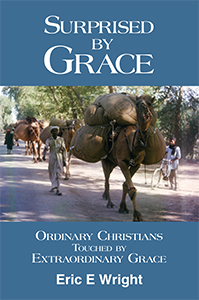Church―No Spectator Sport
In Search of Spiritual Gifts
Publisher; Evangelical Press, England • Large format paperback
464 pages • ISBN 0-85234-314-0
Retail Price: $20 CDN & US • SPECIAL PRICE: $15.00 CDN & US
 TABLE OF CONTENTS
TABLE OF CONTENTS
Part I: Biblical Parameters
Chapter 1: Spiritual Gifts: variety, sovereignty, unity
Chapter 2: The Holy Spirit: awe and adequacy
Chapter 3: The Son of God: source and goal of gifts
Chapter 4: Spiritual Gifts and Charismatic Experience
Chapter 5: Gifts and Talents
Chapter 6: Spiritual Gifts and Response to Need
Chapter 7: Steps to Gift Discovery
Part II: The Speaking Gifts
Chapter 8: The Apostolic Gift
Chapter 9: The Prophetic Gift
Chapter 10: The Gift of Evangelism
Chapter 11: The Gift of Shepherding
Chapter 12: The Gifts of Knowledge and Wisdom
Chapter 13: The Gift of Teaching
Chapter 14: The Gift of Encouragement
Part III: The Serving Gifts
Chapter 15: Helps and Hospitality
Chapter 16: Giving and Mercy
Chapter 17: Faith and Discernment
Chapter 18: Administration and Leadership
Conclusion: Developing a personal & congregational strategy
Appendix: Summary of Spiritual Gifts
INTRODUCTION
Sport is big business. Whether ice hockey, soccer or tennis, professional sports attract enormous crowds. Spectators pack stadiums and arenas around the world to cheer on their favourites. Someone has humorously written to the effect that sport is largely a matter of tens of thousands of fans desperately in need of exercise watching small groups of athletes desperately in need of rest. Spectator sport!
Christians often approach church as if it were a spectator sport. Since we have our own set of heroes, churches that schedule well-known preachers or personalities quickly fill with eager listeners. And listening is, after all, a spectator phenomenon. Don’t take me wrong. I enjoy listening to God’s gifted servants. Unfortunately, the opportunity to listen to good preaching is one positive aspect of a system with many problems. Consider for a moment the weekly worship service.
Early Sunday morning lights come on in widely scattered homes. Soon the aroma of freshly brewed coffee wafts up the stairs. After a careful shave, Dad flicks lint off his Sunday suit and picks a conservative tie. With breakfast laid out on the table, Mom shouts at Dad to wake up the kids while she takes her turn in front of the mirror. The kids straggle down the stairs and wolf a hasty breakfast. Soon the revving of the family car shatters the Sunday stillness as Dad tries vainly to control his desire to blow the horn at his tardy brood. With the family finally on board, Dad speeds away to deposit his well-scrubbed cargo at the door of local church or chapel, cathedral or rented hall.
The faithful greet each other at the church door with a cheery, “Good morning!” Before slipping into their well-worn pews, they comment about the weather or last night’s game. The more enthusiastic have already preceded the “worship crowd” by over an hour to participate in Sunday School.
The hour approaches. A deacon’s frown freezes giggles from squirming children. The rustle of bulletins and the murmur of voices stills as the choir files in. Several dark-suited men men take their places on the platform. Radiating confidence and authority, one strides to the pulpit. All eyes focus on the pastor as another Sunday service begins.
Sports and sacred service—you may ask what they have in common. Although church seldom attracts the crowds which clamour for tickets to a game, both are largely spectator phenomena, dependent on hired professionals for their popularity. Commenting on this phenomenon in Revival, Dr. D. Martyn Lloyd Jones writes, “Now that, of course, is a complete denial of the New Testament doctrine of the Church as the Body of Christ, where every single member has responsibility, and has a function, and matters.”
Fortunately, all over the world, more and more emphasis is being laid on personal participation. In sporting circles many people are taking up jogging, skiing, tennis or hiking. In Christian circles many are discovering spiritual gifts.
Down through history the participation of all God’s people in ministry has waxed and waned. The Protestant Reformation rediscovered, among other truths, the priesthood of all believers. Unfortunately, the legacy passed down to our generation has stressed clergy more than laity. The biblical dynamic of the Church as the Body of Christ with a host of inter-related parts, or as the Temple of God with its inter-locking stones, has been dimly perceived. We forget so quickly the lessons of history.
Too often, the pattern adopted has been more hierarchical and passive than participatory. Professional clergy ministering to receptive laity has become the accepted model of church ministry. Churches almost universally practice one-man ministry; whether that man be called pastor, minister or ruling elder. This denial of universal priesthood has gouged a chasm between pastor and people that many accept as normative. As a result Protestant churches have developed a host of what Earl Radmacher has called, “petty, Protestant, parochial popes.”
I don’t aim to deliver another diatribe against either the full-time pastorate or professionalism in ministry. Let me hasten to point out that I am a professionally trained pastor myself! I have no desire to discourage men from setting the highest standards of excellence in ministerial preparation. Nor is this an appeal for a moratorium on recruiting full-time pastors. Never! Rather I appeal for a return to the priesthood of all believers.
Every-member-ministry is biblically normative. The ascending Lord never proposed that his church become a congregation of spectators! Paul writes in Ephesians four, that when Christ ascended he gave gifts to men that all might participate in ministry. This book, then, concerns those gifts and their use in the local church.
You may sense a danger here. You may ask, “Are not gifts part of the agenda of those modern movements which quickly derail us from our vision?” Genuine concern prompts such a question. The charismatic storm has certainly done more than rattle a few windows! This storm, however, rages within the circle of God’s sovereign providence. And while this truant wind did knock out some traditional windows in its rather destructive course, could it be that God has used it as well to let in a breath of the fresh air of lay ministry? Instead of locking our doors and boarding up the windows even more securely, let us become open to ministry as the Lord intended.
Controversy does tend to distract us from ministry. A third wave of charismatic excitement threatens to swamp our carefully constructed bastions of orthodoxy. This wave provokes us to respond by climbing higher, building our fortresses stronger and letting loose a barrage of theological rockets. There may be a time and place for that—theological confusion does stymie spiritual growth. But before we circle our defences and turn to face the imagined foe we need to evaluate our priorities. Is it a time for controversy or for mutual edification and growth?
After all, we are neither bound to walk in the ruts of tradition, nor constrained to ride the bumpy road of unfettered enthusiasm and novel experience. We have a third alternative; “sola scriptura”—the path delineated by Holy Scripture. “Examine all things, hold fast to that which is true.”
Turning to Scripture, we find considerable emphasis on the practical outworkings of ministry. The storm of controversy surrounding the so-called, charismatic gifts, obscures less controversial gifts such as faith and mercy. In the following chapters I will extract biblical principles about spiritual gifts—so we can understand them. I also want to show how crucial the non-spectacular gifts are in local church life—so we can use them.
The emphasis will be on the discovery, development and implementation of gifts rather than on theological controversy. Our shelves groan under the weight of books written about controversial gifts such as tongues. Less, however, has been published to help us develop speaking gifts such as encouragement or serving gifts such as hospitality. For this reason I will largely confine my attention to a study of those gifts whose practical usefulness is widely accepted.
Doubtless, my readers deserve some explanation about what I believe concerning miracles, healing, tongues and interpretation. Let me state at the outset, that biblical study and personal experience have led me to conclude that God raised up these sign gifts for a specific purpose for a specific historical period. In chapter four I give eleven reasons why I deduce that their relevance ceased with the close of the apostolic period. Doubtless, even these reasons will not answer all the questions. Nevertheless, the weight of evidence does cry out for a moratorium on controversy between different segments of the Church and a revival of ministry within and between the churches.
Nothing prepares us to face questionable issues more than a strong local church in which the reality of mutual ministry creates a climate of warm devotion to Christ and to each other. Novel ideas and spectacular gifts won’t help unhappy and hurting saints. Neither will barrage after barrage of polemic. Cold churches bereft of mutual ministry invite trouble.
We first need to strengthen the gifts that are clearly operative today, before we venture to explore or castigate the esoteric. Chuang Tzu wrote three hundred years before Christ; “For all men strive to grasp what they do not know, while none strive to grasp what they already know; and all strive to discredit what they do not excel in, while none strive to discredit what they do excel in. This is why there is chaos.”
At times the panorama of modern Christendom does resemble chaos. Rather than seeking to discredit the view of others, my goal in this book is to call us to grasp more clearly what we agree on and develop more diligently what we may excel in. In this way, I trust, the body of Christ will prosper and God will be glorified.
Ever since I gave a halting testimony as a new believer, a concern for ministry has burned within. My wife, Mary Helen, and I served as foreign missionaries assigned to Pakistan for over eighteen years. This experience gave us ample opportunity to explore these issues in a non-western culture. Since then we have spent over twelve years in a western context. As a pastor for nine of those years, I grappled with how to inspire all the saints to, “do the work of the ministry.” One of my earliest sermon series explored the subject of spiritual gifts. Now, as I visit various churches in an itinerant preaching ministry, my sense of the importance of this subject has only increased.
The controversy swirling around the subject of spiritual gifts must not be allowed to frighten us away from seeking our biblical heritage. Likewise, confusion about how to define the specific gifts must not become an excuse for us to be entertained spectators while others carry on the work of ministry. Ministry is your job and mine!









Leave a Reply